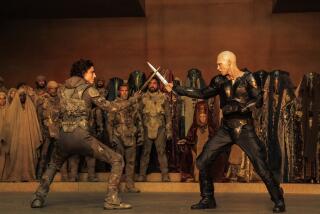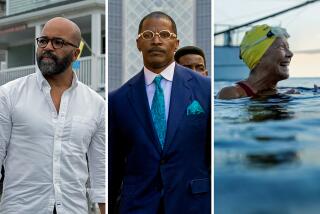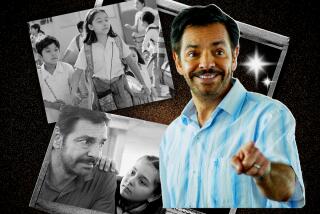Review: ‘Whiplash,’ exquisite and painful, hits all the right notes
Fear. Passion. Blood. Sweat. Tears. Pounding through the beat of a drum. Screaming in the crash of the cymbals. Fast, furious, raging perfection in bleeding hands, broken sticks, broken relationships, broken lives. Debris surrounding transcendent greatness. Ecstasy within the agony.
That is “Whiplash,” with an amazing Miles Teller on drums, a terrifying J.K. Simmons setting the tempo. A movie you feel as much as you see, and what you see is both exquisite and excruciating.
The story belongs to writer-director Damien Chazelle, his nightmare memories of high school, an intense time when the aspiring jazz drummer was driven to excel by a merciless teacher who favored verbal torture and humiliation to mold young minds. His telling of it earned the script a spot on the 2012 Black List of the best unproduced screenplays. When “Whiplash” played at the Sundance Film Festival this year it killed, winning the grand jury prize and audience award for drama.
Oscars 2015: Full coverage
It is one of those scorching films that burns through emotions, uses up actors, wrings out audiences. And the jazz, well, it has its own moments of brutal, breathtaking fusion.
The question Chazelle poses is whether psychological pain is the price of greatness. Does it take emotional scarring and physical extremes to push the talented to reach extraordinary heights?
In “Whiplash,” the answer lurks in the war room of a practice studio at the country’s top college conservatory. Teller is 19-year-old Andrew. Talented, ambitious, a first-year student determined to be the next Buddy Rich, Andrew lives with the legendary drummer’s music pouring through his headphones and his image staring down on him from a poster on the wall.
Nearly all his waking hours are tied to his art. He seeks greatness because he is haunted by failure — his mother left when he was a child; his father (Paul Reiser) is tortured by writing dreams that are nothing more than that: dreams.
Terence Fletcher (Simmons) is both god and the devil at the conservatory. A notoriously demanding teacher, he works only with the best. His rehearsals are boot-camp punishing, anything short of perfection is unacceptable; his retribution is excessive, abusive, in the winning-is-all, over-the-line way we see too often in society today.
Any fond memories you might have of a quirky Simmons (“Juno”), a whimsical Simmons, an empathetic Simmons, will cease to exist. The words “not my tempo” will strike dread, and not just in the hearts of his students. Fletcher’s words carry the same fearsome power whether a whisper or a shout. He can move from punisher to benefactor, grimace morphing into approving smile in a heartbeat. Simmons has never been better.
Nor has Teller.
He’s proved himself to be a fine actor in a string of roles that, after seeing “Whiplash,” you know shortchanged him. As Andrew fights for a spot on Fletcher’s studio band, Teller fights his way into the actor he is meant to be. It’s impossible to list all the elements in the emotional and physical arc he nails from the beginning to the end of the movie, but he arrives at the finish fully formed.
The actor, whose cocksure smile and bedroom eyes have carried him a long way already, treats “Whiplash” like a proving ground. He had some experience on drums. Long weeks of practice paid off with a riveting performance. You believe he felt every sweat-soaked moment, that the bloody hand torn by the sticks, plunging into the ice, was reality, not effects.
So many of Fletcher’s demands, especially for his drummer, are tied to tempo. The same could be said for Chazelle. The filmmaker begins with a black screen and a beat — banging the drum slowly. Darkness gives way to a long, empty corridor. Framed though a doorway at the end is Andrew and the drums. They are so tightly linked in that moment, the creative exchange so focused, it seems the only thing that matters.
Until another door opens and Fletcher walks in. Does the kid interest him? Or is he just one more student to torture? The rest of the film will work its way toward that answer.
The shooting, editing, sets, sound and lighting are exceptional; only what is essential remains. Credit director of photography Sharone Meir, editor Tom Cross, Justin Hurwitz on music, Melanie Paizis Jones’ production design and an indie budget for the bare-bones effect, but it suits.
Fletcher and Andrew are like fighters circling each other, the older a master of mind games, the younger imbued with talent, possible genius, without any idea yet how to channel that power. And when blows begin, they are relentless. The many times and many ways Andrew hits the mat before he walks away or fights back becomes the central emotional arc. The question is who will be the last man standing. The strange synthesis of clarity and ambiguity in the way Chazelle addresses it is both unnerving and intriguing.
These sorts of standoffs and power games have given us some truly great films — Duvall in “The Great Santini,” De Niro in “This Boy’s Life” come to mind. Now “Whiplash” will too.
------------
‘Whiplash’
MPAA rating: R for strong language, including some sexual references
Running time: 1 hour, 46 minutes
Playing: ArcLight, Hollywood; AMC Century City; Landmark, West Los Angeles
More to Read
Only good movies
Get the Indie Focus newsletter, Mark Olsen's weekly guide to the world of cinema.
You may occasionally receive promotional content from the Los Angeles Times.







